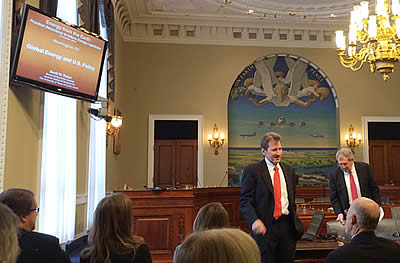Energy from the Earth Briefing: Crossing the Science and Policy Divide

Whitney, Pierce, and Tinker (left to right) discuss energy policy options with congressional staff.
A coalition of geoscience organizations, including The Geological Society of America, co-hosted a briefing on Capitol Hill on 21 November, aimed at enhancing policymakers’ understanding of the geoscience supporting the country’s energy production and innovation. The Energy from the Earth Briefing Series brings geoscientists to Washington each month to highlight vital geoscience information needed for effective policy decisions about energy issues. This inaugural briefing in the series included presentations to a standing-room–only crowd by Gene Whitney, an independent energy consultant; Scott Tinker, State Geologist of Texas and a professor at The University of Texas at Austin; and Brenda Pierce, Energy Resources Program Coordinator at the U.S. Geological Survey.

Scott Tinker presents global energy trends.
Gene Whitney introduced the briefing by giving a broad overview of current energy consumption in the United States and stressing the need for clear, accurate, and impartial communication between researchers and policymakers about the geoscience that should underpin policy decisions.
Scott Tinker discussed global energy consumption and future trends in energy production and use and pointed out the specific roles that geoscience plays in finding and exploiting energy resources. His suggestion for both geoscientists and policymakers was to frame policy decisions around energy security and focus on making energy more affordable, available, reliable, and environmentally sustainable.
Brenda Pierce provided specific examples of advances in the geologic characterization of energy reservoirs, including coal, natural gas, and unconventional resources like gas hydrates and enhanced geothermal systems; such advances have changed the way energy resources are assessed. She ended with a brief discussion of the environmental effects of energy exploration, including the impacts of hydrofracturing and the potential for carbon sequestration.
Future briefing topics include geothermal energy resources, natural gas exports, nuclear energy development and hazards, shale oil and gas production, oil sand potential, and energy exploration in Arctic, Antarctic, and Pacific regions. The briefings are targeted to Congressional staff but are also open to the public. An overview of the series, presentations from this briefing, and details on upcoming briefings can be found here.
The Energy from the Earth Briefing Series is cosponsored by the American Association for the Advancement of Science, the American Association of Petroleum Geologists, the American Geophysical Union, the American Geosciences Institute, the Association of American State Geologists, The Geological Society of America, the National Science Foundation Directorate for Geosciences, and the U.S. Geological Survey. This briefing was sponsored by Rep. Doc Hastings, Chairman of the House Natural Resources Committee.
— Jessica Ball
GSA Science Policy Fellow